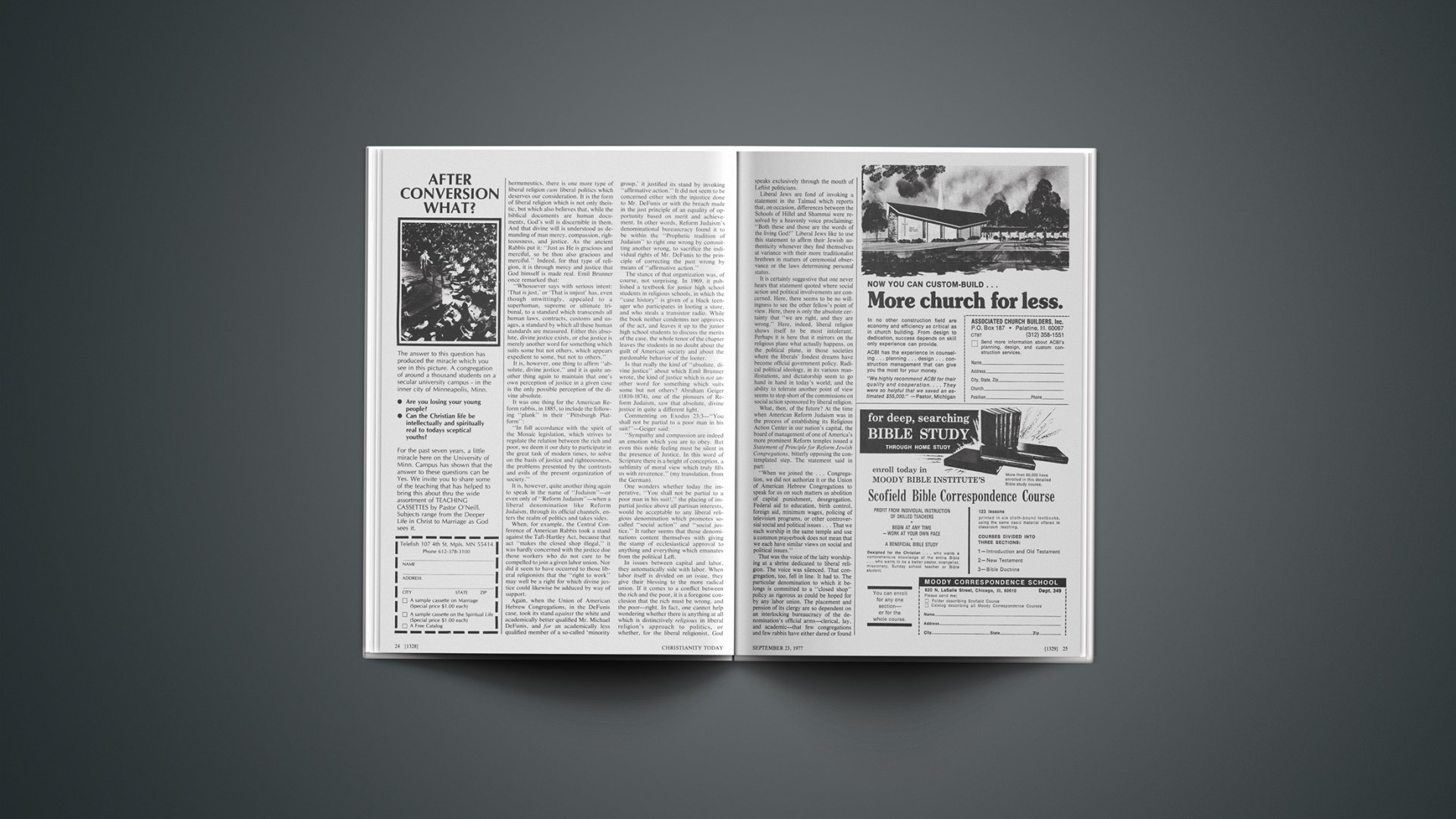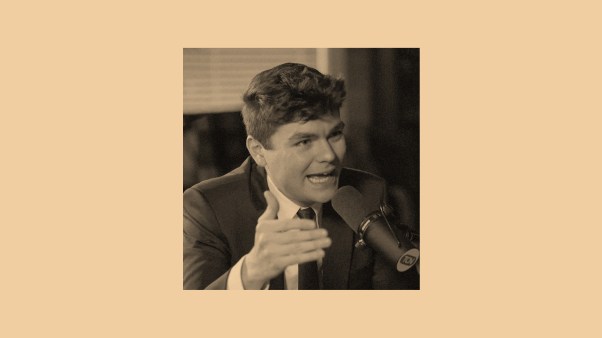There is no a priori reason why a liberal religion should espouse liberalism in politics and champion radicalism in the social order. On the contrary, it would seem to be logical that those who adopt a laissez faire attitude concerning man’s relation towards his religious tradition, towards his church, and towards Almighty God himself would also be averse to man’s enslavement under political doctrines which severely restrict a man’s individual, economic, and educational freedom. But for better or worse, logic does not have the last word in this matter. We have reached the stage in American life where spokesmen of liberal religion can almost invariably be counted on to give their nihil obstat to whatever ideology or scheme the radical (political) left may dream up.
The old and infamous collusion between altar and throne has experienced a modern reincarnation that takes the form of liberal clerical support of radical political causes. This is true whether we think of the editorial policy of the (Protestant) Christian Century, of Catholic priests leading mobs to disrupt state legislatures or pushing the boycott of California grapes, or of the (Reform Jewish) Union of American Hebrew Congregations with its so-called “Religious Action Center” in Washington, D.C., and its frequent pronouncements calling for the support of one kind of leftist activity or another.
It is intriguing to speculate why this should be so. Do we have a recognition here on the part of social activists that their political objectives would stand to gain by being clothed in the garb of divine imperatives, by being prefixed with the words, “Thus saith the Lord”? Or are we dealing with the recognition on the part of religious leaders that traditional beliefs have waned, that traditional religious practice has declined, and that the only way to salvage the whole ecclesiastical machinery of liberal religion is the transposition of theology into the key of the social gospel, and of religious observance into political activism? Or is it a combination of both? Our answers to these questions will naturally depend on where we locate ourselves on both the political spectrum and the religious scale.
Of course, there is always the Bible with its prophets and its social legislation. There can be no doubt that the God of the Bible is a God who demands justice and righteousness, and that the Hebrew prophets were at least as much concerned with social justice as they were with individual salvation.
In 1942 Sidney Dark, a former editor of The Church Times in England, issued an anthology, entitled The Red Bible. In that compilation we find a collection of texts from the Hebrew Bible and the New Testament, arranged under such headings as “The Sin of Usury,” “The Deceitfulness of Riches,” “The God of the Poor,” “The Social Sins,” and so on and so forth.
Around the same time, an Orthodox rabbi, also in England, produced a pamphlet, Torah and Social Order, in which, on the basis of Bible and Talmud, he called for the creation of a Jewish state which would put into practice a Marxist kind of economic system. H. Heinemann, the author, has not reverted to this theme in his many publications during the last thirty years or so, and it may well be that he no longer subscribes to the position he championed in this Jugendschrift. But the pamphlet remains an interesting example of a socialist position based upon an interpretation of Jewish law.
It becomes a matter of biblical exegesis and hermeneutics to determine whether or not the biblical texts, originally addressed to a primitive agrarian society, really commit the latter-day believer to an espousal of socialism in the modern world. There may well be room for argument here. It can, for example, be shown that, apart from occasional sectarian movements, the church as a whole did not consider itself bound by the social system of the primitive church of which we read in Acts 4:32ff that “not a man of them claimed any of his possessions as his own, but everything was held in common … all who had property in land or houses sold it, brought the proceeds of the sale, and laid the money at the feet of the apostles; it was then distributed to any who stood in need” (NEB).
Nor, for that matter, until very recent times, were Torah and Talmud understood by Jews to inculcate a commitment to socialism. In fact, the opposite can be shown to have been the case. For when, at the turn of the century, some of the Jewish youth in Russia rebelled against their fathers’ economics, they rebelled no less against their ancestral religious faith. As Anatole Leroy-Beaulieu has said: “There is, in all the world, perhaps nothing more stubbornly conservative than the talmudic Jew.”
Still, it is quite possible to produce one-sided and partisan collections of biblical and rabbinic proof-texts which would clearly demonstrate that religion commits us to this or that political program or social action platform. It has been done. It is being done. And it will continue to be done. Scripture has always been quoted in support of all kinds of causes, including some which were far less noble than the striving for social justice.
Of course, he who quotes Scripture honestly will also be forced to admit that the evidence of the biblical text is often not quite as one-sided and simplistic as the modern propagandist tries to make us believe. Yes, Exodus 23:6 does tell us: “You shall not deprive the poor man of justice in his suit!” But the very same chapter of Exodus, in verse 3, also warns us not to favor the poor man in his suit. Evidently, the demands of absolute justice, as the author of Exodus 23 understood them, specifically ruled out the “preferential treatment” of the underprivileged.”
All of this, however, is neither here nor there when it comes to our discussion of liberal religion in connection with social ethics and social activism. Only within the context of traditional religion, not to speak of Fundamentalism, would it make sense to argue about present-day political implications of this or that verse in the Bible, and of this or that passage in rabbinic or patristic literature. Even if it could be clearly proved that, “according to the Scriptures,” California grapes should be boycotted if they were picked by laborers belonging to unions other than that of Mr. Cesar Chavez, what would be the force of that particular argument for the liberal religionist?
The late Abraham Joshua Heschel, committed to both social activism and to traditional ceremonial practice, once addressed the Central Conference of American Rabbis, composed of members committed to social activism but not—at least not in Heschel’s sense—to ceremonial practice. Taking it for granted that the Reform rabbis shared his commitment to the biblical basis of social action, and trying to persuade them to join him also in the affirmation of Judaism’s regimen of piety, Heschel argued as follows:
“We all wholeheartedly accept Micah’s words: He has showed you, O man, what is good, and what does the Lord require of you, but to do justice, and to love kindness and to walk humbly with your God. If we believe that there is something which God requires of man, than what is our belief if not faith in the will of God, certainty of knowing what His will demands of us? If we are ready to believe that God requires of me ‘to do justice,’ is it more difficult for us to believe that God requires of us to be holy? If we are ready to believe that it is God who requires us ‘to love kindness,’ is it more difficult to believe that God requires us to hallow the Sabbath and not to violate its sanctity?”
Heschel’s argument, as I understand it, was sound. But, then, I am not a typical representative of what, in some circles, is understood to be liberal religion. Yet, what is open to question is Heschel’s initial premise. Do the members of the Central Conference of American Rabbis really and truly believe that there is anything which the Lord requires them to do? Rhetoric aside, do they even believe that it was God himself who, through the prophet Micah, demanded justice, kindness, and humility? Could not Heschel’s argument be turned around?
“You wholeheartedly reject the notion that God Himself is concerned with Sabbath observance and with dietary laws. You claim to have no certainty of knowing what His will demands of us. You have no faith in Revelation as understood in the Bible. If you are ready to reject the belief that God requires us to hallow the Sabbath, how can you be so sure that God wants us to love our fellowmen? If you reject the biblical and Rabbinic notions of holiness, how can you be so certain that justice is an abiding divine commandment?”
The words of Micah, of Amos, and of Jeremiah ring hollow when they are quoted by those who have no belief in divine revelation, and no faith in the biblical God himself. Those words may be appreciated as literature, treasured as poetry, and valued as historical reminiscence. But, deprived of their antecedent “Thus saith the Lord,” they are unable to compel action to any greater extent than the words of a Shakespeare, a Plato, or a John Updike are able to compel action.
But, perhaps, we have been a little unfair by simply lumping all of liberal religion together, and seeing it only in terms of the theological rejections made by its most radical wings. Perhaps, in fairness, a distinction must be made between those liberal religionists who reject revelation and, on occasion, theism itself, and those liberal religionists who consciously stand within the theistic tradition and who, with all their acceptance of the higher criticism of the Bible, nevertheless affirm a belief in divine revelation.
As far as the first group is concerned, it may not be unfair to say that it is using prophetic quotations as decorative icing on a cake the ingredients of which are, basically, secularism and non-theistic humanism with a soupçon or two of Marxism and other revolutionary critiques of society. In the West, where a certain amount of religious inertia can still be counted on, that doctrine will be proclaimed in the name of the prophets and of the Gospels. In the East, the same doctrine will be preached in the name of Marx, Lenin, and Chairman Mao.
This is not to deny the likelihood that some of those liberal religionists may have received their initial impetus to work for social justice from an exposure to biblical teaching. But it is meant to assert that the specific programs of social action which they currently advocate are, by and large, not programs predicated on biblical premises—since biblical revelation is, by definition, not part of the affirmations of that particular grouping within liberal religion. And a secularist political liberalism, even when packaged in religious terminology, will have to take its chances alongside other secularist political philosophies of a more conservative direction. Its use of religious terminology does not, in and by itself, establish a prima facie claim on acceptance by religious believers.
While we have thus disposed of political radicalism masquerading under a religious garb of which the very presuppositions are denied, and of a biblical kind of socialism derived through fundamentalist hermeneutics, there is one more type of liberal religion cum liberal politics which deserves our consideration. It is the form of liberal religion which is not only theistic, but which also believes that, while the biblical documents are human documents, God’s will is discernible in them. And that divine will is understood as demanding of man mercy, compassion, righteousness, and justice. As the ancient Rabbis put it: “Just as He is gracious and merciful, so be thou also gracious and merciful.” Indeed, for that type of religion, it is through mercy and justice that God himself is made real. Emil Brunner once remarked that:
“Whosoever says with serious intent: ‘That is just,’ or ‘That is unjust’ has, even though unwittingly, appealed to a superhuman, supreme or ultimate tribunal, to a standard which transcends all human laws, contracts, customs and usages, a standard by which all these human standards are measured. Either this absolute, divine justice exists, or else justice is merely another word for something which suits some but not others, which appears expedient to some, but not to others.”
It is, however, one thing to affirm “absolute, divine justice,” and it is quite another thing again to maintain that one’s own perception of justice in a given case is the only possible perception of the divine absolute.
It was one thing for the American Reform rabbis, in 1885, to include the following “plank” in their “Pittsburgh Platform”:
“In full accordance with the spirit of the Mosaic legislation, which strives to regulate the relation between the rich and poor, we deem it our duty to participate in the great task of modern times, to solve on the basis of justice and righteousness, the problems presented by the contrasts and evils of the present organization of society.”
It is, however, quite another thing again to speak in the name of “Judaism”—or even only of “Reform Judaism”—when a liberal denomination like Reform Judaism, through its official channels, enters the realm of politics and takes sides.
When, for example, the Central Conference of American Rabbis took a stand against the Taft-Hartley Act, because that act “makes the closed shop illegal,” it was hardly concerned with the justice due those workers who do not care to be compelled to join a given labor union. Nor did it seem to have occurred to those liberal religionists that the “right to work” may well be a right for which divine justice could likewise be adduced by way of support.
Again, when the Union of American Hebrew Congregations, in the DeFunis case, took its stand against the white and academically better qualified Mr. Michael DeFunis, and for an academically less qualified member of a so-called ‘minority group,’ it justified its stand by invoking “affirmative action.” It did not seem to be concerned either with the injustice done to Mr. DeFunis or with the breach made in the just principle of an equality of opportunity based on merit and achievement. In other words, Reform Judaism’s denominational bureaucracy found it to be within the “Prophetic tradition of Judaism” to right one wrong by committing another wrong, to sacrifice the individual rights of Mr. DeFunis to the principle of correcting the past wrong by means of “affirmative action.”
The stance of that organization was, of course, not surprising. In 1969, it published a textbook for junior high school students in religious schools, in which the “case history” is given of a black teen-ager who participates in looting a store, and who steals a transistor radio. While the book neither condemns nor approves of the act, and leaves it up to the junior high school students to discuss the merits of the case, the whole tenor of the chapter leaves the students in no doubt about the guilt of American society and about the pardonable behavior of the looter.
Is that really the kind of “absolute, divine justice” about which Emil Brunner wrote, the kind of justice which is not another word for something which suits some but not others? Abraham Geiger (1810–1874), one of the pioneers of Reform Judaism, saw that absolute, divine justice in quite a different light.
Commenting on Exodus 23:3—“You shall not be partial to a poor man in his suit!”—Geiger said:
“Sympathy and compassion are indeed an emotion which you are to obey. But even this noble feeling must be silent in the presence of Justice. In this word of Scripture there is a height of conception, a sublimity of moral view which truly fills us with reverence.” (my translation, from the German).
One wonders whether today the imperative, “You shall not be partial to a poor man in his suit!,” the placing of impartial justice above all partisan interests, would be acceptable to any liberal religious denomination which promotes so-called “social action” and “social justice.” It rather seems that those denominations content themselves with giving the stamp of ecclesiastical approval to anything and everything which emanates from the political Left.
In issues between capital and labor, they automatically side with labor. When labor itself is divided on an issue, they give their blessing to the more radical union. If it comes to a conflict between the rich and the poor, it is a foregone conclusion that the rich must be wrong, and the poor—right. In fact, one cannot help wondering whether there is anything at all which is distinctively religious in liberal religion’s approach to politics, or whether, for the liberal religionist, God speaks exclusively through the mouth of Leftist politicians.
Liberal Jews are fond of invoking a statement in the Talmud which reports that, on occasion, differences between the Schools of Hillel and Shammai were resolved by a heavenly voice proclaiming: “Both these and those are the words of the living God!” Liberal Jews like to use this statement to affirm their Jewish authenticity whenever they find themselves at variance with their more traditionalist brethren in matters of ceremonial observance or the laws determining personal status.
It is certainly suggestive that one never hears that statement quoted where social action and political involvements are concerned. Here, there seems to be no willingness to see the other fellow’s point of view. Here, there is only the absolute certainty that “we are right, and they are wrong.” Here, indeed, liberal religion shows itself to be most intolerant. Perhaps it is here that it mirrors on the religious plane what actually happens, on the political plane, in those societies where the liberals’ fondest dreams have become official government policy. Radical political ideology, in its various manifestations, and dictatorship seem to go hand in hand in today’s world; and the ability to tolerate another point of view seems to stop short of the commissions on social action sponsored by liberal religion.
What, then, of the future? At the time when American Reform Judaism was in the process of establishing its Religious Action Center in our nation’s capital, the board of management of one of America’s more prominent Reform temples issued a Statement of Principle for Reform Jewish Congregations, bitterly opposing the contemplated step. The statement said in part:
“When we joined the … Congregation, we did not authorize it or the Union of American Hebrew Congregations to speak for us on such matters as abolition of capital punishment, desegregation, Federal aid to education, birth control, foreign aid, minimum wages, policing of television programs, or other controversial social and political issues … That we each worship in the same temple and use a common prayerbook does not mean that we each have similar views on social and political issues.”
That was the voice of the laity worshiping at a shrine dedicated to liberal religion. The voice was silenced. That congregation, too, fell in line. It had to. The particular denomination to which it belongs is committed to a “closed shop” policy as rigorous as could be hoped for by any labor union. The placement and pension of its clergy are so dependent on an interlocking bureaucracy of the denomination’s official arms—clerical, lay, and academic—that few congregations and few rabbis have either dared or found it feasible to make themselves independent of the structure.
But it is not everywhere that the voice of the laity can be that easily stifled. In other liberal denominations, the recent changes in the clerical “job market” have already led to a perceptible change. Time magazine reported that:
“Too many churches, says the Rev. George Hunter of the Episcopal Divinity School in Cambridge, Mass., ‘got burned during the ’60’s by angry young men,’ and hire graduates who want to perform in the pulpit rather than the streets. When a congregation offers a ‘call’ nowadays, notes the Rev. Vinton Bradshaw of the Christian Theological Seminary in Indianapolis, the message is that ‘they do not want a social activist.’ ”
This, be it noted, is a recent phenomenon on the American scene. It cannot be brushed aside as the final twitches of a long since overcome reactionism. And, if this be a token of a developing mood within liberal Christian denominations, the time may yet come when similar voices will be raised again among the rank and file of Reform Jews.
Upholders of liberal religion had better take heed. Disenchantment with liberal religion’s politics may, one day, lead to disenchantment with liberal religion itself. If the freedom of religious thought and the liberty of the individual conscience in matters theological must necessarily and inevitably lead to the clerically tailored straitjacket of political ideology, then liberal religion stands condemned by its own initial presuppositions.
Perhaps the time has come for a radical rethinking, a rethinking that allows for the same latitude in the appraisal of social problems and their solutions that it posits for man’s relation to his God and to his particular religious tradition. Such a radical rethinking may well come to the conclusion that, while God’s justice might be absolute, man’s perception of it is something less, something determined by man’s relative situation.
There is a curious provision in Jewish Law which states that, when a court of twenty-three judges unanimously condemns a man to die, then the capital punishment is not imposed. The Law, in other words, was suspicious if there was not at least something which could be said in favor of the accused. Tomorrow’s liberal religion will have to allay such suspicions regarding itself. Let it, by all means, condemn the evils of our society, but let it also be careful to apportion guilt and blame even-handedly.
If it wants to be compassionate to the inner city criminal, let it not be lacking in justice and compassion to the criminal’s victim. If it wants to score the deficiencies of the capitalist system, let it not close its eyes to the disadvantages inherent in the alternative systems. If it insists on condemning the evils of colonialism, let it not overlook the recurrent famines and civil strife that are ravaging those parts of the world from which the colonial powers have departed. If it wants to extol the virtues of the welfare state, let it not conceal the inequities, the tax burdens, the lack of freedom, and the limitations on economic initiative to which the welfare state gives rise. If it wants to champion the cause of labor, let it not forget that, without capital, there would be no labor.
Let us also take to heart the fact that all political philosophies and systems are human and, therefore, fallible. Long ago, the Deuteronomist warned that “the poor will never cease out of the land” (Deut. 15:11), and Jesus echoed him by saying that “you always have the poor with you” (Mark 14:7). Neither the Deuteronomist nor Jesus could be accused of being opposed to “equality before the law.” But they can be understood to imply that no scheme devised by man, no system and no ideology, will ever succeed in eradicating the differences in natural endowment, in ability, and in application, which since time immemorial have led to the stratification of societies. And that includes the particular social system that the Deuteronomist himself espouses as the very Word of God!
The human condition makes for inequities, for suffering, and for inequalities. In the name of justice, man is bidden to temper the inequities. In the name of compassion, he is mandated to alleviate the suffering and the inequalities. Various political philosophies and various approaches to the economic and social scene have set themselves the task of implementing the demands of justice and compassion. Religion has the duty of sensitizing its believers to the moral issues involved. But, having done that, it has no mandate to enter the political realm itself, to recognize in some courses of political action, but not in others, a monopoly on justice and compassion. A theocracy could, conceivably, afford to do so, but, then, a theocracy is not exactly the political ideal of the liberal religionist.
It would comport well with the basic premises of liberal religion for it to show itself aware of this fact—and, therefore, to refrain from the attempt to regiment its adherents in the cause of partisan political action. Let it recognize once and for all that both the political liberal and the political conservative can be equally devoted to the fundamental principles of liberal religion. Let it understand at last that voluntarism rather than compulsion is no less essential in the realm of social action than it is in the sphere of theological commitment.
At one time, liberal religion rebelled against the collusion between altar and throne. If it now also rebels against the collusion between liberal religion and leftist politics, then—and perhaps only then—will its future be assured.
Paul D. Steeves is assistant professor of history and director of Russian studies at Stetson University in Deland, Florida. He has the Ph.D. from the University of Kansas and specializes in modern Russian history.










